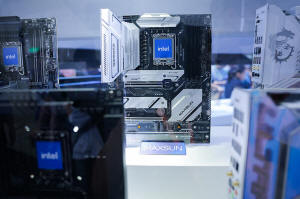Intel shares slump 26% as turnaround struggle deepens
 Send a link to a friend
Send a link to a friend
 [August 03, 2024] By
Noel Randewich and Arsheeya Bajwa [August 03, 2024] By
Noel Randewich and Arsheeya Bajwa
(Reuters) -Intel shares sank 26% on Friday in their worst day since 1974
after the chip manufacturer suspended its dividend and slashed its
workforce to fund a costly turnaround after losing its once-dominant
global position.
The company lost more than $30 billion in market value after it gave a
disappointing forecast and said it would cut 15% of its workforce,
deepening worries about its ability to catch up with Taiwan's TSMC and
other chipmakers.
The stock ended the day at $21.48, its lowest since 2013.
"Intel's issues are now approaching the existential in our view,"
Bernstein analyst Stacy Rasgon said.
Rasgon said Intel could add $40 billion in cash to its balance sheet by
the end of 2025 through the moves, as well as subsidies and partner
contributions.
While Intel's manufacturing setbacks are specific to the Santa Clara,
California-based company, other chipmakers also sank for a second
straight day.
Weak employment numbers on Friday caused a sharp increase in worries
about a slowdown in the U.S. economy, leading traders to bet that the
U.S. Federal Reserve will deliver a big half-percentage-point rate cut
in September, instead of a 25-bp cut expected before the data.

"The excitement over AI and large cap technology is coming back to
earth. The future is still bright, but the truth is investors got a tad
too excited and once again, we see when everyone gets on one side of the
boat what can happen," said Ryan Detrick, chief market strategist at The
Carson Group.
Companies selling equipment used in factories run by Intel and other
manufacturers fell sharply, signaling investor concerns about the pace
of future investments in manufacturing infrastructure. Applied
Materials, ASML Holding and KLA Corp all dropped around 8%.
The PHLX chip index sank 5.2%, bringing its loss this week to almost
10%.
Nvidia dropped almost 2%, with the dominant seller of AI processors down
over 20% from its record high close on June 18.
Heightened worries about a recession, along with quarterly reports from
Amazon and Alphabet that failed to impress Wall Street, have fueled
doubts about the future pace of investment in AI, said Ross Mayfield, an
investment strategy analyst at Baird.
"There's a broader question of whether this AI capex can continue
basically vertical or exponential growth, especially if the macro
backdrop is softening," Mayfield said.
'FORGOTTEN HORSEMAN'
Intel was once the world's leading chipmaker, with the "Intel Inside"
logo a valuable marketing feature on personal computers in the 1980s and
1990s.
Part of the dotcom era's Four Horsemen - along with Cisco Systems,
Microsoft and Dell - Intel's stock market value peaked at nearly $500
billion in 2000 before slumping that year and never recovering.
[to top of second column] |

Intel Motherboard can be seen on display at Computex in Taipei,
Taiwan June 5, 2024. REUTERS/Ann Wang/File Photo

It continued to dominate in brawny PC chips, but was caught
off-guard by the launch of Apple's iPhone in 2007 and other mobile
devices that demanded lower power and less pricey processors.
Now valued at about $91 billion, Intel is worth less than 5% of
Nvidia and about 40% of Advanced Micro Devices', two PC chipmakers
it loomed over for decades until recently.
"Intel has been one of the forgotten horsemen of technology the last
couple decades - never overtaking its year 2000 highs and struggling
to get earnings back to where they were before the AI revolution,"
said Michael Schulman, chief investment officer of Running Point
Capital.
Its server chip business has been taking a hit for several years as
companies prioritize spending on AI chips, where it lags Nvidia,
which has become one of the world's most valuable firms thanks to
booming demand for its processors.
To regain its manufacturing edge, Intel plans to spend $100 billion
across four U.S. states to build and expand factories after securing
$19.5 billion in federal grants and loans.
The company told investors on Thursday it remains "comfortable" with
those CHIPS program plans.
Intel's turnaround plan depends on persuading outside companies to
use its manufacturing services. But analysts said the push to
energize the business could take years. For now, it is increasing
Intel's costs and pressuring profit margins.
Intel's unsecured bond that offers a coupon of 5.15% and is due in
2024 was trading 20 basis points wider on Friday, way above bonds of
other companies, according to investors. Its 5.6% unsecured bonds
due in 2054 also widened by 17 basis points.
The higher trading volume compared to other bonds was due to Intel's
recent earnings report, bond market participants said.
"That's weighing on bond trading," said Dave Novosel, senior
investment analyst at corporate bond research firm Gimme Credit.
"They see that they may need to come back to market for a modest
amount of debt."
(Reporting by Noel Randewich in Oakland, California, and by Arsheeya
Bajwa and Aditya Soni in Bengaluru; Additional reporting by Matt
Tracy in New York and Arsheeya Bajwa in Bangalore; Editing by Arun
Koyyur, Will Dunham and David Gregorio)
[© 2024 Thomson Reuters. All rights
reserved.]
This material may not be published,
broadcast, rewritten or redistributed.
Thompson Reuters is solely responsible for this content.
 |